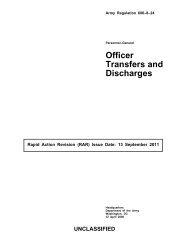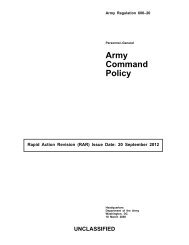Patient Administration - Army Publishing Directorate - U.S. Army
Patient Administration - Army Publishing Directorate - U.S. Army
Patient Administration - Army Publishing Directorate - U.S. Army
Create successful ePaper yourself
Turn your PDF publications into a flip-book with our unique Google optimized e-Paper software.
disposition considerations as would apply in the case of a U.S. military member until transfer can be made. This will<br />
include processing through the medical evacuation system.<br />
e. <strong>Patient</strong>s not requiring admission to an MTF will be returned to their nearest national organization under<br />
arrangements to be made locally.<br />
5–21. Foreign military patients from non-NATO nations<br />
When no disposition instructions are available for such patients, a request for instructions will be forwarded to<br />
USAMEDCOM, ATTN: MCHO-CL-P, 2050 Worth Road, Fort Sam Houston, TX 78234-6010.<br />
5–22. Types of disposition for nonmilitary patients<br />
Dispositions of Federal civilian employees and OWCP beneficiaries are discussed in paragraphs 3-14, 3-15, and 3-24.<br />
For other nonmilitary patients, the dispositions shown in a through e below apply.<br />
a. Discharge from the MTF when the patient is released to his or her own custody or custody of the sponsor, NOK,<br />
or other authorized persons. (Appointments or instructions for follow-up treatment, if required, are initiated by the<br />
attending medical officer.)<br />
b. Transfer to another MTF (para 2-13).<br />
c. Absent without release (when the patient departs without proper release or is otherwise unaccounted for).<br />
d. Release against medical advice. (The patient or other authorized persons will be required to complete DA Form<br />
5009-R (Medical Record-Release Against Medical Advice) as indicated in AR 40-66.)<br />
e. Death.<br />
5–23. Nonmilitary patients mentally ill in a foreign country<br />
a. U.S. military commanders in foreign countries have no authority under either domestic law or international law to<br />
evacuate nonmilitary patients involuntarily. This lack of authority prevails even in medical emergencies when mental<br />
illness renders patients dangerous to themselves and others.<br />
(1) The involuntary evacuation of a nonmilitary patient to the United States or elsewhere will occur only when the<br />
removal has been authorized by authorities of the host government. For persons serving with, or accompanying the<br />
Armed Forces or a non-DOD Federal agency, such authorization should be obtained by or with concurrence of the<br />
patient’s sponsoring service or agency. A nonmilitary person who has been ordered removed may not be evacuated<br />
involuntarily except when delivered to proper authorities at the port of embarkation (POE).<br />
(2) In no case will non-U.S. nationals be evacuated involuntarily between countries. An exception is when such<br />
evacuation is required by treaty or agreement with the host government, and the patient is delivered to U.S. control at<br />
the POE by authorities of the receiving State. Major overseas commanders and the Commander, U.S. <strong>Army</strong> Forces<br />
Command will seek, through the proper U.S. foreign services establishments, to conclude agreements or understanding<br />
on procedures to be followed.<br />
b. Before the actual evacuation date of the hospitalized nonmilitary mental patients, the actions in (1) through (5)<br />
below will be taken.<br />
(1) Through coordination with the sponsor, if one is involved, and his or her commander or supervisor, determine<br />
when the sponsor will depart for the United States If the sponsor’s departure will be at the approximate time of the<br />
Family member’s evacuation, the sponsor will be advised to immediately report to the gaining MTF in the United<br />
States<br />
(2) If the sponsor will proceed to the United States substantially later than the date of the Family member’s<br />
evacuation, the sponsor must designate the following in writing: the name, address, relationship, and if possible, the<br />
telephone number of one relative or another person to act on the sponsor’s behalf with respect to the patient. The<br />
person designated should be willing to go to the receiving MTF to provide necessary assistance.<br />
(3) A statement should be prepared for the sponsor’s signature indicating the sponsor’s understanding of his or her<br />
responsibilities to the patient. This statement will also reflect the sponsor’s present duty station, expected leave address<br />
in CONUS, if applicable, and the next duty station or assignment in CONUS, if known. This statement will be in<br />
addition to the one required in (2) above and will be obtained regardless of the sponsor’s anticipated departure date.<br />
(4) A copy of the statements prescribed by (2) and (3) above will be incorporated in the patient’s ITR to aid the<br />
receiving MTF in getting any assistance needed.<br />
(5) When a military sponsor is to proceed to the United States at a date after the evacuation of the Family member,<br />
his or her commander will coordinate with the <strong>Army</strong> Travelers Assistance Center (ATAC) personnel assistance point to<br />
notify the gaining MTF commander of the departure date, mode of travel, port of entry, and expected time of arrival in<br />
the United States When the sponsor arrives, the ATAC will also notify the gaining MTF commander when the sponsor<br />
departs the station, the expected time of arrival at the MTF, the interim address where the sponsor may be reached, and<br />
any leave or delay en route. The sponsor will be advised to promptly notify the MTF commander of any change in the<br />
reported schedule or leave address.<br />
c. After arrival in the United States, the patient may withdraw the request for hospitalization and request release<br />
from the MTF. Disposition will normally be made to proper civilian authorities or, with the approval of those<br />
46 AR 40–400 27 January 2010
















